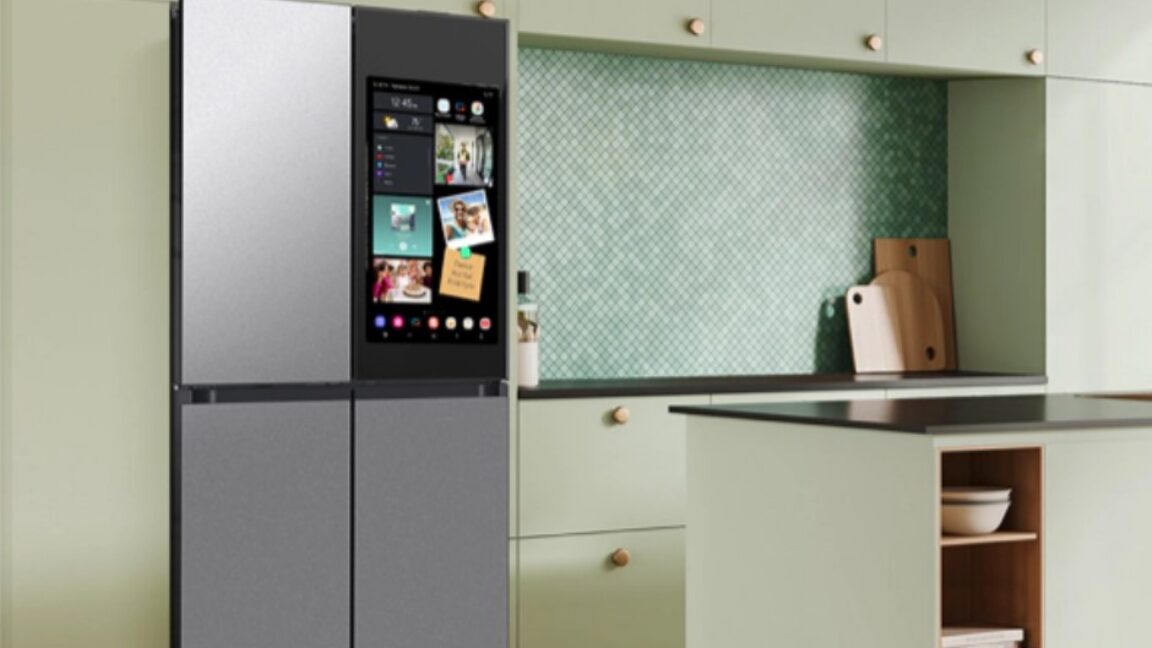
Credit: Samsung
Days after someone revealed the news on social media, Samsung confirmed today that it is showing advertisements on some US customers’ smart fridges. Samsung said the ads showing on some Family Hub-series fridges are part of a pilot program, but we suspect that they may become more permanent additions to Samsung fridges and/or other types of screen-equipped smart home appliances.
In a statement sent to Ars Technica, Samsung confirmed that it is “conducting a pilot program to offer promotions and curated advertisements on certain Samsung Family Hub refrigerator models in the US market.”
Samsung currently lists nine Family Hub refrigerators in the US, which have MSRPs ranging from $1,800 to $3,500. Family Hub fridges have 21.5- or 32-inch screens, which, until now, users have had autonomy over for displaying helpful or fun things, like photos and videos, memos, weather, timers, and a web browser. Some of those abilities require a Wi-Fi connection or a Samsung account.
Now, Samsung is commandeering some of the screens already set up in homes to display ads. As Samsung’s rep explained:
As a part of this pilot program, Family Hub refrigerators in the US will receive an over-the-network (OTN) software update with Terms of Service (T&C) and Privacy Notice (PN). Advertising will appear on certain Family Hub refrigerator Cover Screens. The Cover Screen appears when a Family Hub screen is idle. Ad design format may change depending on Family Hub personalization options for the Cover Screen, and advertising will not appear when Cover Screen displays Art Mode or picture albums.
If a user doesn’t like a particular ad, they can remove it so that they won’t see the ad “again during the campaign period,” Samsung’s rep noted.
Samsung declined to respond to specific questions sent about the pilot program, including which fridge models are affected and its response to customers who may be irked that their expensive appliance is suddenly showing ads.
Samsung hasn't been particularly forthcoming about the program, which appears to have been publicly disclosed for the first time by a Reddit user, as spotted by SamMobile.
A picture that the Redditor posted shows a message purportedly displayed on a Samsung fridge informing owners of the ads, reading: "To enhance our service and offer additional content to users, advertisements will be displayed on the Cover Screen for the Weather, Color, and Daily Board Themes.”
A Reddit user shared this notice shown on Samsung fridges.
Credit: angrycatmeowmeow/Reddit
Samsung recently downplayed the idea of using smart appliances' screens for ads. While speaking with The Verge in April, Jeong Seung Moon, EVP and head of the R&D team for Samsung Electronics' Digital Appliances Business, said Samsung had “no plans regarding the inclusion of advertisements on AI Home screens.”
Technically, the pilot program is running on fridges' larger "Cover Screens," not “AI Home Screens,” which are smaller (7 -or 9-inch) touchscreens that Samsung introduced to appliances in late 2024. But it still feels like Samsung missed numerous opportunities to manage expectations with its rollout of ads on Samsung products.
You can see the smaller AI Home Screens on these Samsung appliances.
Credit: Samsung
Despite this, some may have been tipped off to Samsung's potential shift to ads from the company's growing obsession with putting screens on products that are usually controllable with more repairable, affordable, and simpler solutions, like buttons and dials. But there are still bound to be people upset to see their fridge updated to display commercial messaging where their family eats and cooks.
Another reason to leave appliances offline
Based on Samsung’s statement, users can prevent ads from showing on their smart fridges by having the screen show photos or art. However, that limits the ways people can use their expensive fridge.
Another option is to disconnect the fridge from the Internet. Again, though, this would eliminate some core capabilities, like its meal planner, recipes, and shopping list features.
On the other hand, some Samsung fridge owners may not even notice the update, considering that vendors have struggled to get people to connect home appliances to the Internet. Less than half of the smart appliances that LG had sold were online in 2023, for example.
Smart appliance makers that would like to access the valuable user data and ad revenue that are available when people connect their appliances to the web battle privacy concerns, indifference, and technical limitations. Samsung's reminder to everyone about how easy it is for tech companies to turn people's smart appliances into billboards is another deterrent.
But with expensive and large electronics purchases happening infrequently for most households, many tech companies are increasingly relying on ads for recurring revenue. It's very unlikely that Samsung's pilot program will be the last we hear of the sudden appearance of ads on smart home devices.

-
 C114 Communication Network
C114 Communication Network -
 Communication Home
Communication Home


